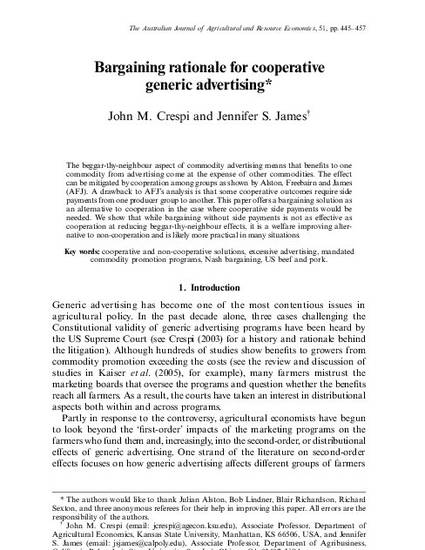
Article
Bargaining rationale for cooperative generic advertising
The Australian Journal of Agricultural and Resource Economics
(2007)
Abstract
The beggar-thy-neighbour aspect of commodity advertising means that benefits to one commodity from advertising come at the expense of other commodities. The effect can be mitigated by cooperation among groups as shown by Alston, Freebairn and James (AFJ). A drawback to AFJ’s analysis is that some cooperative outcomes require side payments from one producer group to another. This paper offers a bargaining solution as an alternative to cooperation in the case where cooperative side payments would be needed. We show that while bargaining without side payments is not as effective as cooperation at reducing beggar-thy-neighbour effects, it is a welfare improving alternative to non-cooperation and is likely more practical in many situations.
Keywords
- cooperative and non-cooperative solutions,
- excessive advertising,
- mandated commodity promotion programs,
- Nash bargaining,
- US beef and pork.
Disciplines
Publication Date
2007
DOI
10.1111/j.1467-8489.2007.00385.x
Publisher Statement
2007 Australian Agricultural and Resource Economics Society Inc. and Blackwell Publishing Ltd. Posted with permission.
Citation Information
John M. Crespi and Jennifer S. James. "Bargaining rationale for cooperative generic advertising" The Australian Journal of Agricultural and Resource Economics Vol. 51 (2007) p. 445 - 457 Available at: http://works.bepress.com/john-crespi/9/
